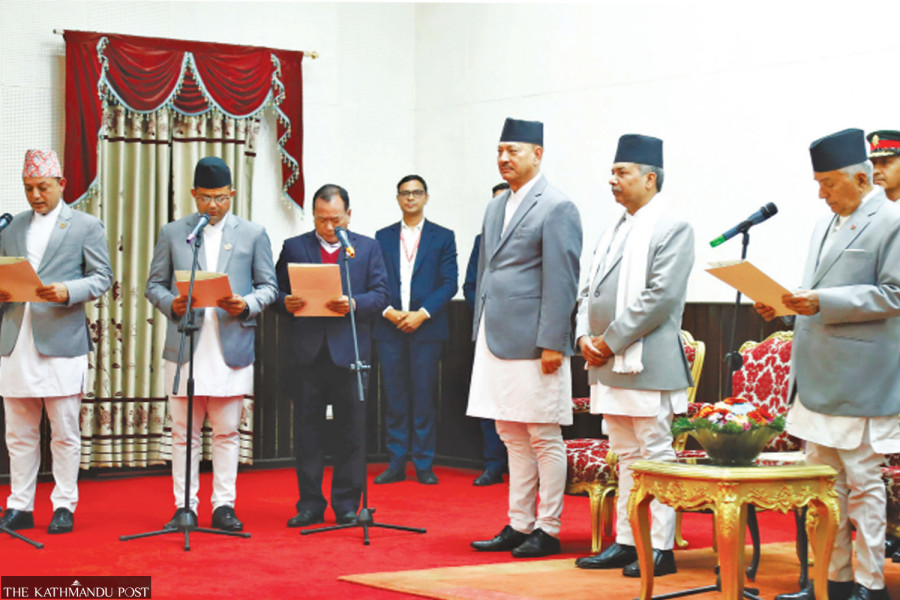Politics
Growing rift, Oli’s overtures ended Congress-Maoist coalition
Some in the Nepali Congress see external hand in the break-up, but leftist politicians attribute it to long-running differences between Dahal and Deuba.
Anil Giri
The unexpected and quick fall of the old alliance between the Nepali Congress and CPN (Maoist Centre) on Sunday night has sparked widespread curiosity—and some concern.
Prime Minister Pushpa Kamal Dahal, who describes himself as a ‘dynamic’ leader and believes in self-transformation as per the need of the hour, ousted the Nepali Congress and the CPN (Unified Socialist) from his Cabinet while he brought in the CPN-UML and the Rastriya Swatantra Party.
There are many speculations about what caused the break-up of the old coalition and why Prime Minister Dahal suddenly changed course, apparently betraying his old partners even though they fought the local, provincial and federal elections together.
The reasons cited include growing rift between the Congress and the Maoist Centre, especially after Maoist candidate Champa Karki lost the elections to the National Assembly from Koshi Province, and Congress chief Sher Bahadur Deuba’s reluctance to replace finance minister Prakash Sharan Mahat, who had strained relations with the prime minister.
Besides these factors, the recently-concluded Mahasamiti meeting of the Congress where the party decided to contest the next national elections independently without forging any alliance, also prompted the Maoist Centre to ditch the Congress, a Standing Committee member of the Maoist Centre said.
The Maoist Centre had also expressed its reservations over some proposals endorsed by the Congress Mahasamiti and the campaign by some senior Congress leaders for the restoration of the Hindu state.
While both the Congress and the Maoists had been staking claim to the post of National Assembly chair, now the post is likely to go to the Maoist Centre.
According to some Congress leaders, differences with the Maoist Centre were manageable. But they said both domestic and external factors had roles in Dahal’s ‘betrayal’.
“I am under pressure to join hands with the UML,” Dahal reportedly told Deuba on Sunday morning while communicating his decision to ditch ties with the Congress. “I am going to form a new coalition with the UML’s support.”
Deuba and Congress Vice-president Purna Bahadur Khadka, an outgoing deputy prime minister, were said to be in regular touch with Dahal and they had reportedly assured him that the Congress would support the Maoist bid for National Assembly chair, and also offered both the home and finance ministries. “But Dahal declined Deuba’s offer,” a Congress office bearer said. “He had already made up his mind to betray us.”
Ganesh Shah, secretary of the Maoist Centre, quoted Dahal as saying that the Congress’ reluctance to remove finance minister Mahat and health minister Mohan Bahadur Basnet, who faces corruption charges, had driven a big wedge between the two parties.
“I pushed for several initiatives for economic reform, but the finance minister declined them all, leading to growing frustration among the people,” said the prime minister. “I found the UML’s proposal of leftist unity encouraging, so I decided to sever ties with the Congress.”
Dahal on Monday said that no one can manipulate him and his party.
“No reactionary forces can use me,” he said at an event on Monday. “Some reactionary forces call me unpredictable, but they could still not use me. If anyone tries to trap me, I have the ability to kick my way out.”
CPN (Unified Socialist) spokesman Jagannath Khatiwada said the Maoist Centre and the Congress were in dispute over foreign and economic policies. “The prime minister used to feel trapped by the Congress. Oli’s design has worked again.”
But the Unified Socialist, a member of the outgoing coalition, is reluctant to join the new one.
“After the Nepali Congress decided to contest elections independently, the Maoists needed new political support, which it got from the UML. This is in preparation for the next elections [three years away]. Second, the rift between Dahal and Deuba was widening over the issue of finance minister Mahat. These were the major reasons why the coalition collapsed,” said Khatiwada.
On the other hand, Deuba on Monday said that he kept ignoring Oli’s overtures fearing that such meetings would impact the ruling alliance. During a meeting of the party’s former and sitting office bearers, he said Oli would call him twice a day for meetings, but he refused to meet the UML chief due to concerns about the coalition’s fate.
“I was ready to surrender everything, but Dahal still betrayed me. His intention was to betray me. Dahal is now saying that the Nepali Congress did not allow him to reshuffle the Cabinet, which is not true. If not today, he would have betrayed me some other time,” said the office bearer quoting Deuba.
“This development did not happen overnight,” Deuba said at the meeting. “It is the result of over six months of talks between Dahal and Oli.”
“Their intent is to bring communist parties together, and so there is also an external factor,” the office bearer said.
But Maoist Centre secretary Devendra Poudel ruled out any role of external actors behind the formation of the new political equation between UML and the Maoist Centre.
Some Congress leaders hinted at Chinese hand behind the two communist parties coming together again, something the northern neighbour has long encouraged.
“That is not true,” said Poudel. “We took this step to complete the unfinished tasks of the Nepal Communist Party.” The NCP was formed in 2019 after a merger between the UML and Maoist Centre, but dissolved in 2021 by a Supreme Court verdict.
Khatiwada also ruled out Chinese involvement. “Had the Chinese been behind this, we would definitely know,” said Khatiwada. “The Chinese always encourage left unity, but they don’t insist on it.”




 12.12°C Kathmandu
12.12°C Kathmandu















